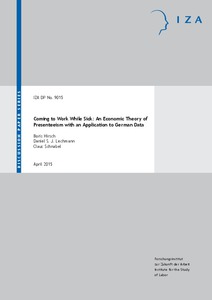Coming to work while sick: an economic theory of presenteeism with an application to German data
"Presenteeism, i.e. attending work while sick, is widespread and associated with significant costs. Still, economic analyses of this phenomenon are rare. In a theoretical model, we show that presenteeism arises due to differences between workers in (health-related) disutility from workplace att...
| Main Authors: | , , |
|---|---|
| Institution: | ETUI-European Trade Union Institute |
| Format: | TEXT |
| Language: | English |
| Published: |
Bonn
2015
IZA |
| Subjects: | |
| Online Access: | https://www.labourline.org/KENTIKA-19113281124919314639-Coming-to-work-while-sick-an-e.htm |
| Summary: | "Presenteeism, i.e. attending work while sick, is widespread and associated with significant costs. Still, economic analyses of this phenomenon are rare. In a theoretical model, we show that presenteeism arises due to differences between workers in (health-related) disutility from workplace attendance. As these differences are unobservable by employers, they set wages that incentivise sick workers to attend work. Using a large representative German data set, we test several hypotheses derived from our model. In line with our predictions, we find that bad health status and stressful working conditions are positively related to presenteeism. Better dismissal protection, captured by higher tenure, is associated with slightly fewer presenteeism days, whereas the role of productivity and skills is inconclusive." |
|---|---|
| Physical Description: | 28 p. Digital |

